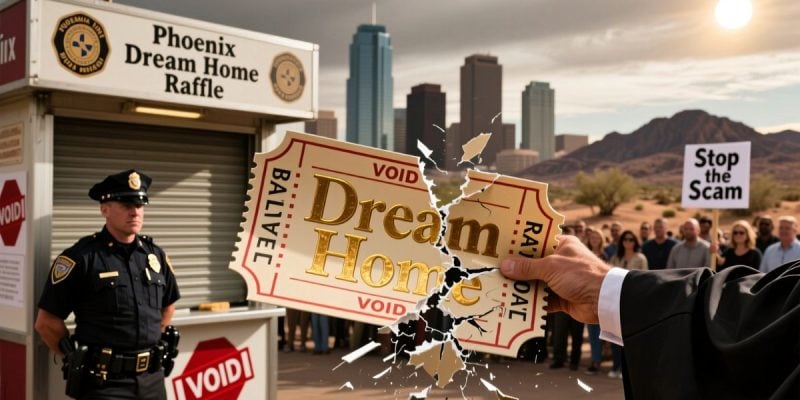State gaming regulators have issued cease-and-desist notices to a U.K.-based company, Raffall, and Arizona resident John Smith, identified as operators behind the Phoenix Dream Home sweepstakes platform.
Authorities said Smith, acting as an operator, unlawfully promoted a raffle for a $1.3 million property in north Phoenix. Regulators determined the arrangement was illegal because it failed to comply with state raffle laws. The decision drew national attention after its announcement on Tuesday, Sept. 9.
How AZ regulators decided the sweepstakes broke gambling laws
Regulators concluded the Phoenix Dream Home promotion went beyond legal limits. Smith offered a raffle for a $1.3 million mountainside property, with tickets starting at $10.
To win the home, a minimum number of tickets had to be sold. If sales fell short, the prize shifted to 50% of the funds collected.
Officials emphasized that raffles are only permitted when run by nonprofit, tax-exempt organizations, and operators may not receive personal income. Under the Phoenix Dream Home model, Smith and Raffall stood to profit from the remaining proceeds. Authorities classified the setup as unlawful gambling.
Through the action, the Arizona Department of Gaming signaled it is prepared to intervene when sweepstakes sites offer illegal services.
How operators can avoid illegal online gambling charges
There are no winners in this case, but there are lessons. Sweepstakes platforms often exploit legal loopholes that allow casino-style gaming without requiring a gambling license.
If authorities uncover violations, however, platforms may face immediate shutdowns, fines or litigation—leaving players without access or funds. Avoiding such problems requires operators to carefully structure offerings in compliance with state and federal regulations.
Other states join Arizona in cracking down on sweepstakes casinos
Michigan and New York have already taken tougher stances, issuing cease-and-desist orders to more than 30 sites in the past four months.
By contrast, Texas and other states maintain inconsistent or ambiguous rules, exposing operators to enforcement only when disputes arise.
Consumer complaints and media scrutiny could push more states toward stronger regulation. Still, approaches are likely to vary, with some regulators prioritizing other issues. One constant: the more visible a sweepstakes becomes, the more likely it will attract regulatory oversight.
Will this push Arizona toward legal online casinos?
Ironically, the crackdown on sweepstakes may bolster support for legalized gambling. As sweepstakes sites close, players may demand safer, regulated alternatives. Licensed and legal real-money online casinos typically provide stronger consumer protections and generate state tax revenue.
In Arizona, the sweepstakes action could fuel pressure to consider regulated options. Similar debates could emerge elsewhere as players seek transparency and operators pursue stability.
The Arizona crackdown on sweepstakes casinos has already sparked conversations about legalizing online gambling. Key questions remain:
- Will Arizona restrict more sweepstakes platforms?
- Will players demand safer, regulated alternatives?
- Will lawmakers view legal online casinos as a solution?
For now, the decision has put sweepstakes-style gaming in the spotlight. What once seemed a safe middle ground between marketing and gambling may no longer be.
Players and operators face a new reality after Arizona’s move
Arizona’s action against the Phoenix Dream Home sweepstakes offers clear lessons for both players and operators. Regulators are closely monitoring gaming activity and willing to intervene when laws are broken.
For players, it highlights the risks of unlicensed gaming. For operators, it underscores the need for strict compliance with gambling laws.
The debate over regulated online casinos is resurfacing in Arizona. If lawmakers move forward, the state could see increased revenue from legalized gambling—and players would gain access to safer, licensed platforms.









